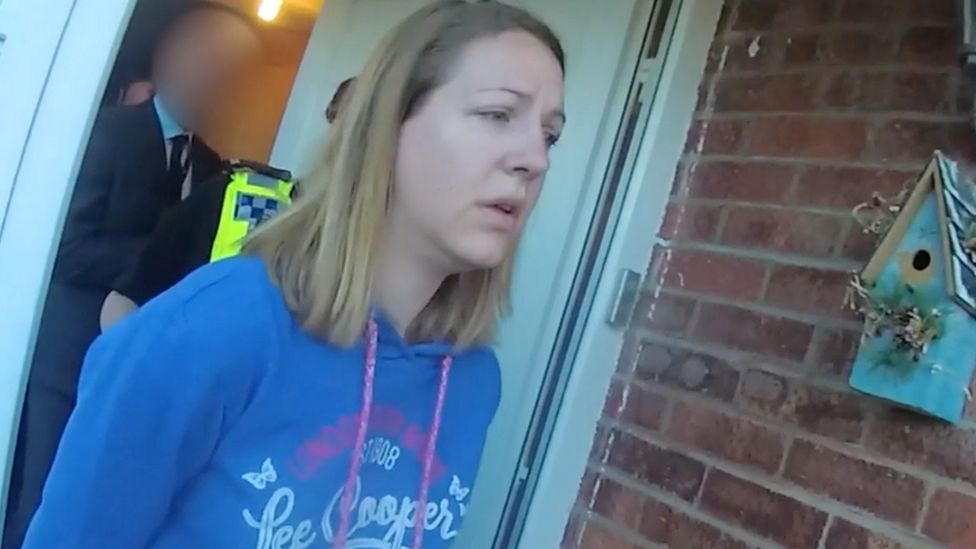21 minutes ago
About sharing
A judge should lead the inquiry into the circumstances behind Lucy Letby’s attacks on babies, the health select committee chairman has told the BBC.
As it stands, the inquiry looking at the crimes will not have the power to compel witnesses to give evidence.
Conservative MP Steve Brine said some “may not be so willing” to cooperate.
Meanwhile, the prosecution’s lead medical expert in the case has said hospital executives who failed to act should be investigated by police.
Letby was found guilty of murdering seven babies and attempting to murder six others at the Countess of Chester Hospital between 2015 and 2016, following a 10-month trial.
The nurse was found not guilty of two attempted murders and the jury could not reach verdicts on six others. She will be sentenced on Monday.
The aim of the separate non-statutory inquiry is to ensure lessons are learned, the government has said.
But concerns have been raised by some over how effective it will be in examining the case.
Some have called for a statutory inquiry with legal powers to compel witnesses to give evidence. Statutory inquiries are often led by a minister-appointed judge.
Non-statutory inquiries can be converted into statutory inquiries if they have been shown to cause public concern.
“I think a judge-led statutory inquiry is in order here,” Mr Brine told BBC Radio 4’s Broadcasting House programme.
“What I want to see… is not a process that drags on for years, an inquiry that can disappear down a rabbit hole.”
He added that a “proper judge-led” inquiry was the only way to ensure public confidence.
Jane Tomkinson, acting chief executive officer at the Countess of Chester Hospital NHS Foundation Trust, said the trust welcomed the announcement of the independent inquiry and would be supporting the ongoing investigation by Cheshire Police.
“Due to ongoing legal considerations, it would not be appropriate for the Trust to make any further comment at this time,” she said.
Cheshire Constabulary has been approached for comment.
Mr Brine is the latest to question the powers available to the inquiry in its current form.
Slater and Gordon, the law firm representing two of the families of babies attacked by Letby, said a non-statutory inquiry “is not good enough” and lessons had to be learned by the hospital, NHS and wider medical profession.
Labour’s City of Chester MP Samantha Dixon told the BBC that as it stood the inquiry would have to rely on “the goodwill of witnesses to attend”.
But Dr Caroline Johnson, Conservative MP and consultant paediatrician, said lessons needed to be learned quickly and the government could decide to order a statutory inquiry at a later date if extra powers were needed.
Dr Bill Kirkup, who has led non-statutory reviews for other maternity units, said non-compliance had not been a problem in his experience and people were “ready and willing to cooperate”.
The patient safety investigator told the BBC he had identified common features between the Letby case and the reviews he had conducted – including managers accused of “protecting reputations” above listening to staff concerns.
After the verdict, Countess of Chester Hospital NHS Foundation Trust said it was “extremely sorry” the crimes happened in its hospital and it had since made “significant changes” to their services.
Former chief executive of the hospital Tony Chambers and former medical director Ian Harvey, who were in charge at the time Letby was working at the hospital, have said they will co-operate fully with the inquiry.
Mr Chambers has also told The Observer newspaper that he took “prompt action” including to move Letby off the neonatal unit when concerns were first escalated to him in June 2016.
Dr Nigel Scawn, medical director at the Countess of Chester Hospital, said on Friday: “Since Lucy Letby worked at our hospital, we have made significant changes to our services and I want to provide reassurance to every patient that may access our services that they can have confidence in the care that they will receive.”
Retired consultant paediatrician Dr Dewi Evans, who gave expert evidence during the trial, said he believed the case demanded a criminal investigation into corporate manslaughter, in comments first made to the Observer.
He told the BBC he intended to write to Cheshire Police to ask it to investigate bosses for not acting on the concerns of doctors.
“I intend to write…[to say I] believe we need to investigate the senior executives in this hospital for what in my opinion is gross dereliction of duty and repeated failures to engage effectively with experienced senior medical professionals,” he said.
“The NHS is a corporate organisation with a chief executive – they have a duty of care to patients and staff. They failed patients and staff, and hospital management should be accountable to a disciplinary body in the same way doctors are.”
If you, or someone you know, have been affected by the issues raised here, there are details of organisations that may be able to offer support on the BBC Action Line.
Related Topics
23 hours ago
1 day ago
